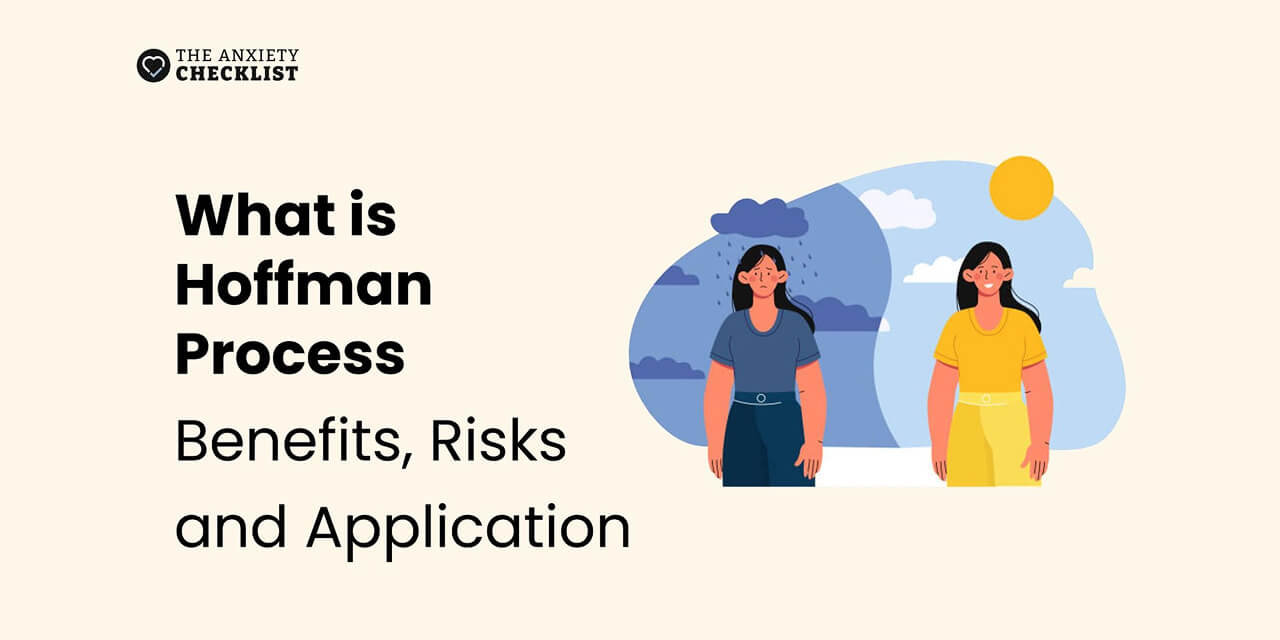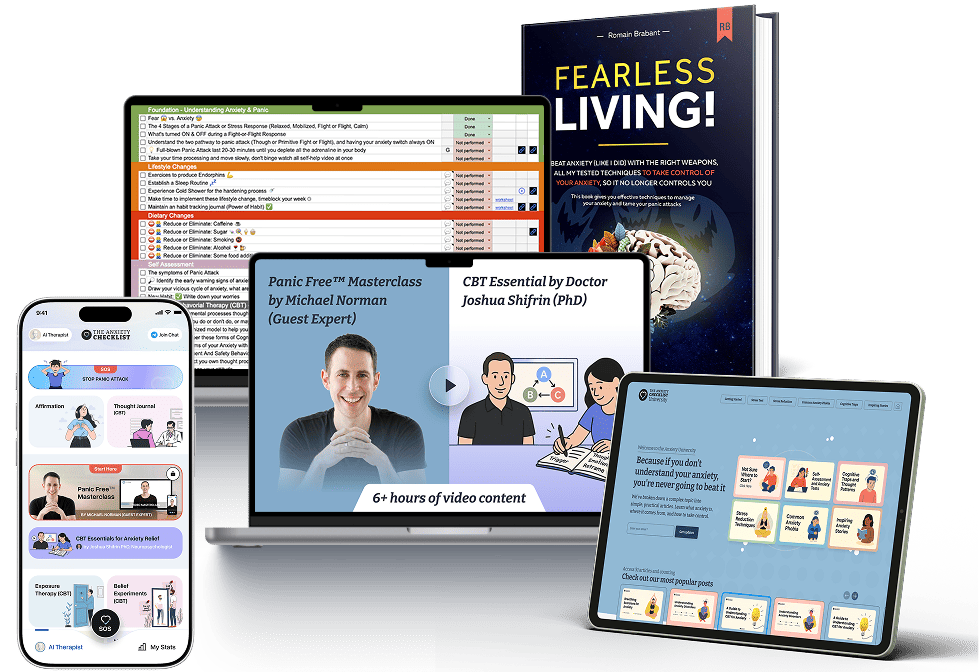When anxiety hits, do you know what to do next?
Learn how to calm your body, interrupt fear loops, and regain control step by step.
The Hoffman Process: History and Founder
The Hoffman Process was created by Bob Hoffman, a self-taught American teacher who believed that emotional pain often stems from unresolved childhood patterns.
He started developing the method in the late 1960s by asking clients to write biographies detailing their lives from childhood to puberty. He would then study these biographies to understand the relationship between the clients and their parents.
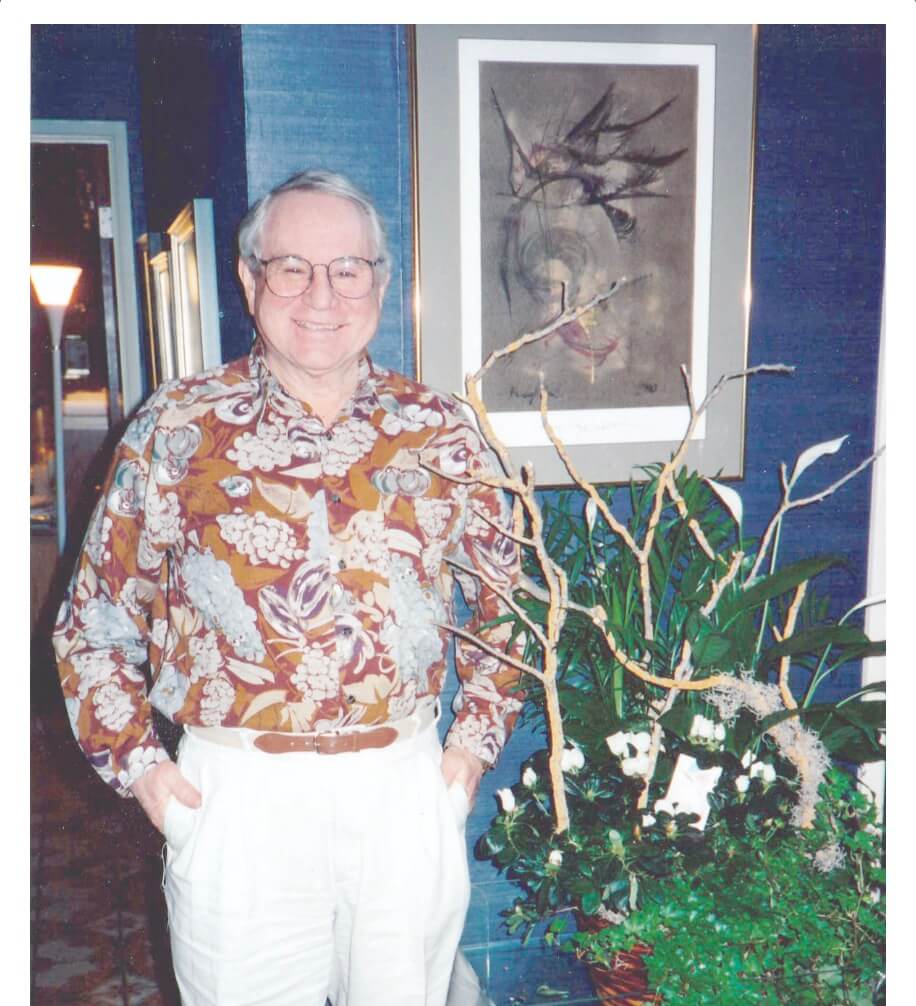
Bob Hoffman originally called his method the “Negative Love Syndrome.” He believed children learn to accept love and approval by adopting their parents’ emotional behaviors, even if those behaviors are unhealthy.
Over time, the process evolved and became more structured, eventually turning into the week-long residential program we now know as the Hoffman Process.
This process gained wider attention in the 1980s when psychologists and therapists began to see its potential.
Today, it’s offered in several countries and has been translated into multiple languages.
Foundational Philosophy of the Hoffman Process
The Hoffman Process is built on a clear set of ideas that help guide how the program works. Here are the core foundational philosophies that form its backbone.
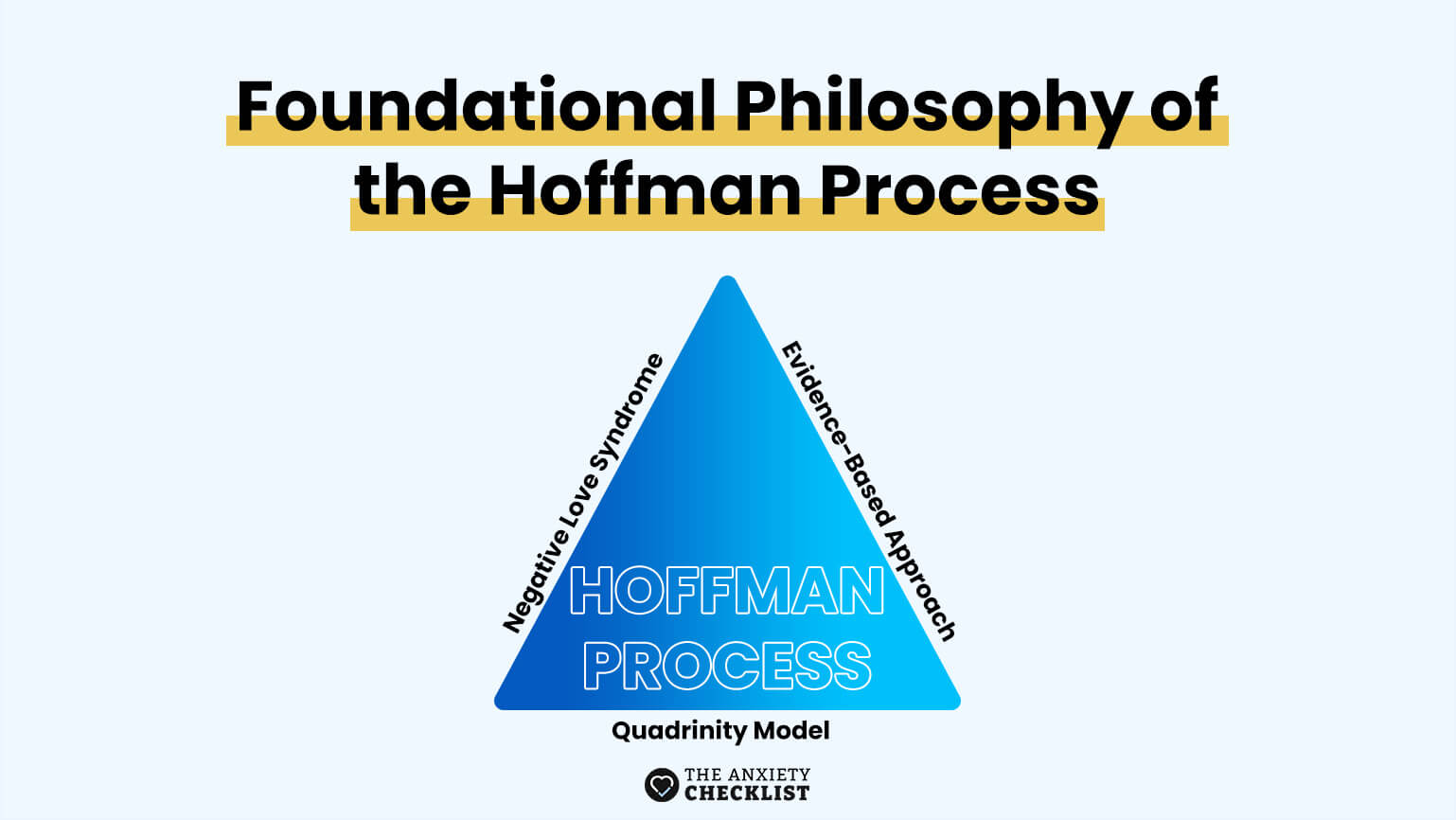
Negative Love Syndrome
This idea comes from the belief that children unconsciously copy emotional habits from their parents or caregivers. Even when those habits cause harm later in life, they can be hard to let go of because they feel familiar.
The Hoffman Process helps you identify these patterns and understand how they were formed in the first place.
Through guided emotional work, the process helps you break that cycle and form healthier relationships with yourself and others.
Quadrinity Model
Another key part of the Hoffman Process is the Quadrinity Model. According to this approach, humans are made up of four aspects: the intellect, the emotional self, the physical body, and the spiritual self.
The Quadrinity process aims to bring balance across all four. Instead of only focusing on thoughts or feelings, it includes physical exercises, emotional release, and space for spiritual reflection.
Evidence-Based Approach
The Hoffman Process uses proven tools taken from several types of therapy. These include cognitive behavioral therapy, meditation and mindfulness practices, and psychodynamic work. It also includes body-based approaches like bioenergetics.
Scientific studies have also shown that people who complete the Hoffman Process often report fewer anxiety-induced panic attacks. Many have also described feeling more emotionally stable in their daily lives.
Core Components of the Hoffman Process
Several essential components of the Hoffman Process make it work. Here are a few to take note of.
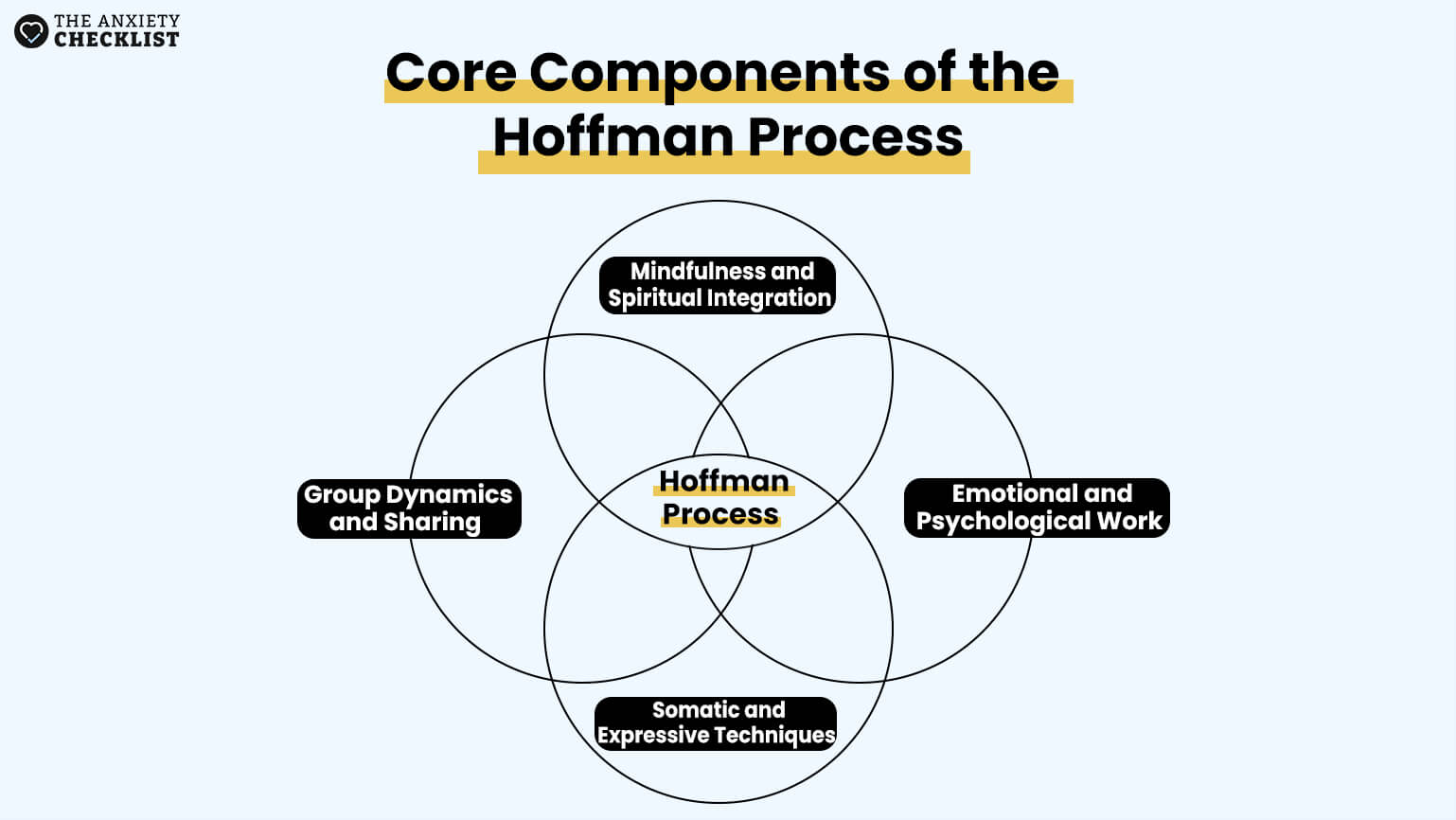
Emotional and Psychological Work
The Hoffman Process helps you reconnect with your early life experiences. This is achieved through guided visualizations and personal journaling. They help uncover stories from your childhood that still influence present-day behavior.
After assessing your early life, you’ll be able to navigate it better through emotional expression and release. This can include grief, anger, shame, or resentment that may have built up over time.
This component also includes “re-parenting” exercises, where you’re given a chance to empathize with and nurture your younger self.
Somatic and Expressive Techniques
Somatic techniques relate to the body, which also holds onto emotional pain. The Hoffman Process also works with this.
It includes physical activities like breathing exercises and expressive arts. For example, this might involve shouting into a pillow, chopping wood, or moving the body in certain ways to help release tension or emotion.
While these actions may feel out of place at first, people who have tried them admit that they help release emotions when talking doesn’t work.
Mindfulness and Spiritual Integration
This component of the Hoffman Process includes practices designed to help you slow down and reconnect with your deeper self. It includes meditation, quiet reflection, and guided visualization.
They’re not meant to teach you spiritual beliefs; instead, they help you feel more present and more in tune with what matters most to you.
This is an opportunity to reconnect with a part of yourself that has been quiet for a long time.
Group Dynamics and Sharing
This is the final component of the Hoffman Process. Healing may be personal, but sometimes you make better progress in group settings.
Being heard and witnessing others doing the same builds a strong sense of support. That shared space also helps many individuals feel seen in a way they haven’t before, making them feel less isolated.
Scientific Backing of the Hoffman Process
It’s not just testimonials from people who have found success from the Hoffman Process that make it credible. It’s also backed by several scientific studies.
Here’s a quick summary of some notable research studies conducted over the years.
UC Grant Research Study – Drs. Levenson and Aldwin
This study looked at individuals who completed the Hoffman Process and compared their emotional health before and after.
Researchers used standard psychological tools to measure social anxiety, depression, emotional control, forgiveness, and more.
The results showed that these individuals felt less anxious and depressed. They have also become more compassionate and shown better control over their emotions, even six months after the program.
The Caldwell Report – Drs. Caldwell and Hileman
This report took a slightly different approach. It focused on emotional reactivity, stress responses, and how participants relate to others after the program.
The findings revealed reduced feelings of anger and guilt, along with greater emotional stability and increased empathy.
The researchers also found something interesting about identity. People who finished the process reported having a clearer sense of who they are. They also felt more capable of managing relationships in a calm, less reactive way.
Candate Study – Alison Candate
This research paid close attention to adult development. The study followed a group of participants before the Hoffman Process, right after it ended, and again three months later.
It measured how people moved through adult growth stages, particularly around how they handle inner conflict and personal change.
A key takeaway from this study is how fast some of these changes happened. While adult development is often gradual, people in this group showed measurable progress within weeks.
Windhausen Overview – Christiane Windhausen
This overview pulled together interviews, written feedback, and long-term follow-ups from past participants.
While it’s not as heavy on numbers as the other studies listed here, it offered a closer look at how people described their experience. Words like “relief,” “freedom,” and “peace” came up often.
Windhausen also pointed out how many participants reported better relationships at home and work. Some had more patience with their kids, while others said they could finally forgive a parent or partner.
Benefits of the Hoffman Process for Anxiety
You now understand what the Hoffman Process is and the scientific studies that back it. Let’s now explore the notable benefits of this program.
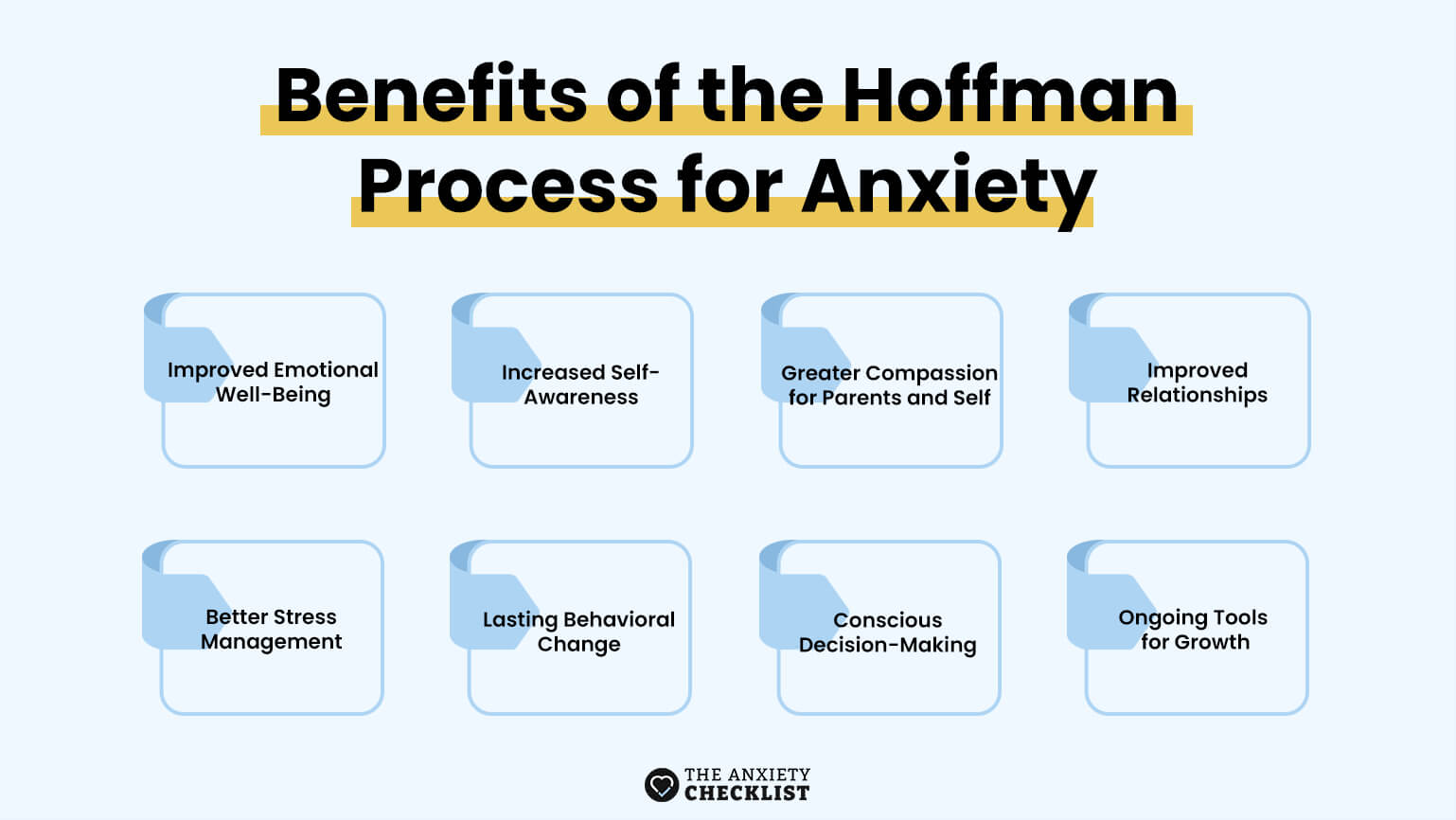
1. Improved Emotional Well-Being
Many people carry emotional pain they’ve never had a chance to process. The Hoffman Process helps you feel and express those emotions safely.
You’ll be given tools to manage anxiety, anger, sadness, guilt, and fear without burying or judging them. This kind of release makes room for relief and peace.
You don’t simply get the space to talk about your feelings; you experience them and move through them.
2. Increased Self-Awareness
The Hoffman Process is a good starting point for developing self-awareness. It helps you spot patterns that influence your actions without you realizing it.
You start to see how certain beliefs and habits come from your early experiences with parents or caregivers. This kind of clarity gives you the power to make new choices.
Instead of reacting without knowing why, you start to notice your anxiety triggers and pause before acting. That space between feeling and reacting is where change begins.
3. Greater Compassion for Parents and Self
It’s common to blame your parents for how they may have handled your formative years. The Hoffman Process allows you to gain a new perspective.
It shows how your parents likely passed on behaviors they learned as kids. This doesn’t excuse hurtful behavior but provides room for understanding and healing.
When you see that your parents are also humans doing life for the first time, you begin to feel kinder toward yourself as well.
4. Improved Relationships
Forgiveness and acceptance can open doors to improved relationships. Once you stop reacting to emotional pain from the past, your relationship with others naturally starts to shift.
You find it easier to listen, speak honestly, and let go of taking things personally. Conflicts become less about blame and more about understanding.
Plus, the people around you — your friends and family — will start to notice the difference. Your interactions become more natural and relaxed as you move beyond old patterns.
5. Better Stress Management
The Hoffman Process doesn’t remove stress from your life, but it helps you respond to it properly. Feelings of worry, anger, and overthinking can shift to calmness and being grounded.
You also become more aware of your inner critic, the harsh voice that ramps up anxiety. The Hoffman Process gives you tools to quiet it, which helps you deal with tough situations.
6. Lasting Behavioral Change
The Hoffman Process works on emotional, mental, and behavioral levels. You’ll experience lasting lifestyle changes that might last throughout your lifetime.
The Hoffman week gives you a full experience of what it’s like to live without your usual patterns. That lived experience is more likely to stick with you.
7. Conscious Decision-Making
Before undergoing the Hoffman Process, some people find that their choices are influenced by fear, guilt, or a desire to please others.
After the process, you’re clearer on what matters to you. That makes it easier to make sound choices. It doesn’t mean you always get it right, but your choices start to feel more true to who you are now.
8. Ongoing Tools for Growth
The Hoffman Process doesn’t end after seven days. You leave with specific practices that help you grow, such as journaling, guided visualizations, and daily awareness exercises.
These practices will help you navigate tough situations, helping you come back to yourself. This sense of inner stability helps you stay grounded and open.
The Hoffmann process has been known to change lives by helping people detect negative patterns of behavior, break them, and become the person they truly are.
Here is a short video on how the Hoffmann process can help:
When to Use the Hoffman Process
The following are some key moments in your life where adopting the Hoffman Process can help you.
Wanting to Break Generational Cycles
If you notice the same painful patterns showing up in your family over generations, the Hoffman Process can help you stop them from repeating.
By working through these patterns in a focused way, you start breaking the emotional habits you may have learned without even realizing it.
You’ll learn healthier ways of responding so you can set a different example for those who come after you.
Major Life Transitions
Big changes, such as a career shift, a breakup, or moving to a new place, can leave you feeling unsettled.
The Hoffman Process can help you process the emotions and thoughts that surface from these experiences, so you can start the next chapter with a clearer mind.
You’ll learn practical tools for handling the uncertainty that often comes with change, enabling you to respond calmly and groundedly.
Experiencing Burnout or Chronic Stress
If stress has been your constant companion, the Hoffman Process can offer a reset. It helps you understand why you may feel the need to push yourself past your limits.
This process doesn’t just teach you to relax in the moment. It shows you how to change the patterns that lead to burnout in the first place.
Persistent Self-Criticism
The Hoffman Process helps you identify where your self-criticism comes from and why it has so much power over you.
This understanding is the first step to replacing this voice with a kinder and more balanced way of talking to yourself.
Over time, that self-compassion changes how you approach challenges and gives you more confidence in your abilities.
Unresolved Childhood Wounds
Old wounds from childhood can shape how you see yourself and how you relate to others. According to the World Health Organization, 6 in 10 children under the age of 5 suffer physical and psychological violence at the hands of their parents.
The Hoffman Process gives you a safe space to revisit those experiences.
When you address these wounds directly, you stop carrying them into your current relationships. They also stop affecting your decisions. You start responding to situations based on who you are now, not the hurt child you once were.
Repeating Negative Patterns in Relationships
If you find yourself repeatedly facing frustrating patterns in your relationships, the Hoffman Process can help you see why.
It helps you trace those patterns back to their roots and understand what keeps pulling you toward them.
This change isn’t just about romantic relationships. It can also improve how you relate to friends, family, and coworkers. You learn to set healthier boundaries.
Struggling to Forgive
Lastly, the Hoffman Process can help if you’re struggling with forgiveness. Holding onto resentment can weigh you down more than you realize.
By letting go of that weight, you create more room for peace in your life. You’re no longer tied to the hurt or the things that cause you anxiety.
Criticism and Risk Factors
The Hoffman Process has enough testimonials from people who found relief from their crippling phobias. However, the process has received its fair share of criticism. Here are some of them.
1. High Cost
It will cost you a course fee of about $6,200 on top of a non-refundable $500 registration fee. You’re looking at several thousand dollars for one week, not counting travel or time off work. For some, that’s a serious investment that could bring financial stress.
2. Overwhelming Emotional Intensity
The program takes you through intense emotional work in a very short time. You may face buried feelings and painful memories you didn’t expect to confront. This can feel like too much too soon.
This level of emotional pressure can push you to break old patterns, but it can leave you feeling drained. It’s important to have support in place after the retreat to avoid slipping back.
3. Not Suitable for Unstable Mental Conditions
If you’re living with severe anxiety disorders like depression, psychosis, or other unstable mental health conditions, the program can be risky without medical support. This is because the intensity could trigger symptoms or worsen your state.
In these cases, working closely with a licensed mental health professional is a better option. The Hoffman Process isn’t a substitute for clinical treatment.
4. Lack of Standardized Regulation
The self-development retreat industry doesn’t have the same strict regulations as licensed therapy. Therefore, standards and quality control can vary.
While the Hoffman Institute has its structure and training, the lack of third-party oversight can make some people cautious. You’ll need to do your research before committing.
5. Relies Too Heavily on Group Sharing
The Hoffman Process involves a lot of open sharing in group settings. This can be powerful, but it can also feel unsafe if you’re uncomfortable discussing personal issues with strangers.
Even though confidentiality is encouraged, there’s always a risk of feeling exposed. If group vulnerability isn’t your thing, this aspect may hold you back from fully engaging.
6. Limited Scientific Research
There are some studies (like the ones we quoted earlier) that show positive results. Still, the Hoffman Process doesn’t have enough scientific backing like psychotherapy and other established therapies
This doesn’t mean it doesn’t work, but you should be aware that the research base is smaller. If evidence is important to you, that might affect your decision.
7. Potential Cultural Mismatch
The Hoffman Process draws heavily on Western psychology and personal growth traditions. For people from other cultural backgrounds, some methods or ideas may feel unfamiliar or irrelevant.
You may find a few aspects of the process relatable, but overall, it won’t be of much help if the most important parts feel foreign.
Frequently Asked Questions
Is the Hoffman Process for You?
Previous Article

Coping Cards: A Simple Yet Powerful Tool for Mental Wellness
Next Article
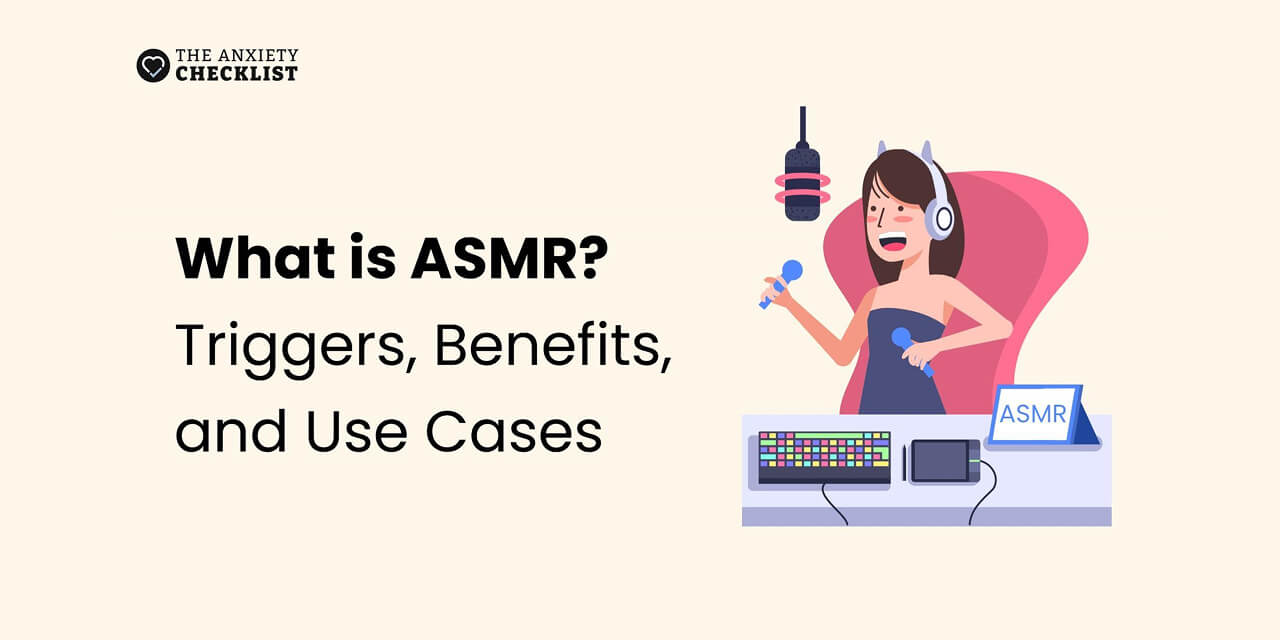
What is ASMR? Triggers, Benefits and Use Cases
If you are in a crisis or any other person may be in danger - don't use this site. These resources can provide you with immediate help.



